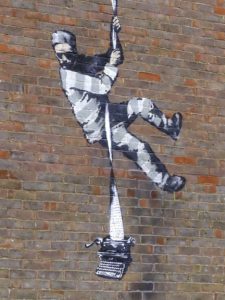A British arts charity has announced that it will add several thousand pieces of street art to its public art database. The charity Art UK, founded in 2003, works to provide online access to every public art collection in Britain. The organization has documented over 300,000 works of art kept by over 3,400 museums and other cultural institutions to make Britain’s art more accessible. And last week, they announced a new initiative that aims to document and digitize the country’s street art and murals. According to Art UK’s Deputy Director Katey Goodwin, this project will take approximately three years and aims to digitize approximately 5,000 murals across Britain. The organization understands that street art is always at risk, partially because some street art is classified as graffiti and is therefore covered up or defaced. However, they also recognize that the buildings themselves, upon which some street art is made, are at risk: “From shopping centres and railway stations to churches and museums, we will celebrate the thousands of painted and sculptural murals in our communities. Many of these are at risk of decay or demolition, so the work of our staff and volunteers will ensure that a permanent record is created.” This project comes not long after Art UK’s successful efforts to catalogue over 50,000 sculptures in museums and public spaces across Britain.
The project will undoubtedly include the digitization of murals by the anonymous street artist Banksy. Art UK has already digitized the mural Escaping Convict at Reading Gaol, painted on the red brick wall of a former prison. Preserving street art has been a topic of conversation in British art circles. Cities like Glasgow are taking measures to protect street artists by setting up walls where graffiti artists will be free to create without fear of having their work destroyed by police or a local council. Several have used Banksy as an example of how some works of street art are given appreciation and prestige when done by a well-known artist, yet they are covered up and defaced when made by an unknown.
However, murals and other forms of street art are incredibly important in certain places in Britain. Northern Ireland, in particular, has a long history with murals, serving as an important form of political expression during the Troubles, which lasted until 1998. Although the conflict has been officially over for more than 25 years, there is always work to be done. Northern Irish public art not only expresses one political opinion or another but commemorates important individuals or events. Art UK has recognized that, with the murals in cities like Belfast and Derry, the documentation needs to be handled with the utmost sensitivity, which is why they are working with professors from Ulster University’s Transitional Justice Institute.
Art UK’s street art digitization includes cooperation with the National Lottery Heritage Fund, which has allocated £250,000 for the project. Art UK also plans to work with organizations like CultureStreet, VocalEyes, Historic England, and the Pilgrim Trust.

